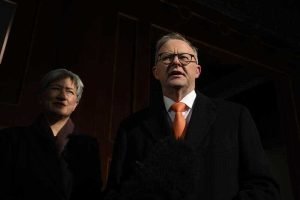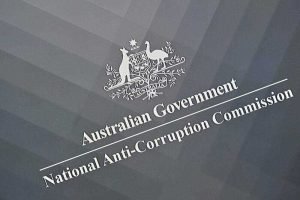The Shot
False balance: how Australia’s media fucked up the NBN
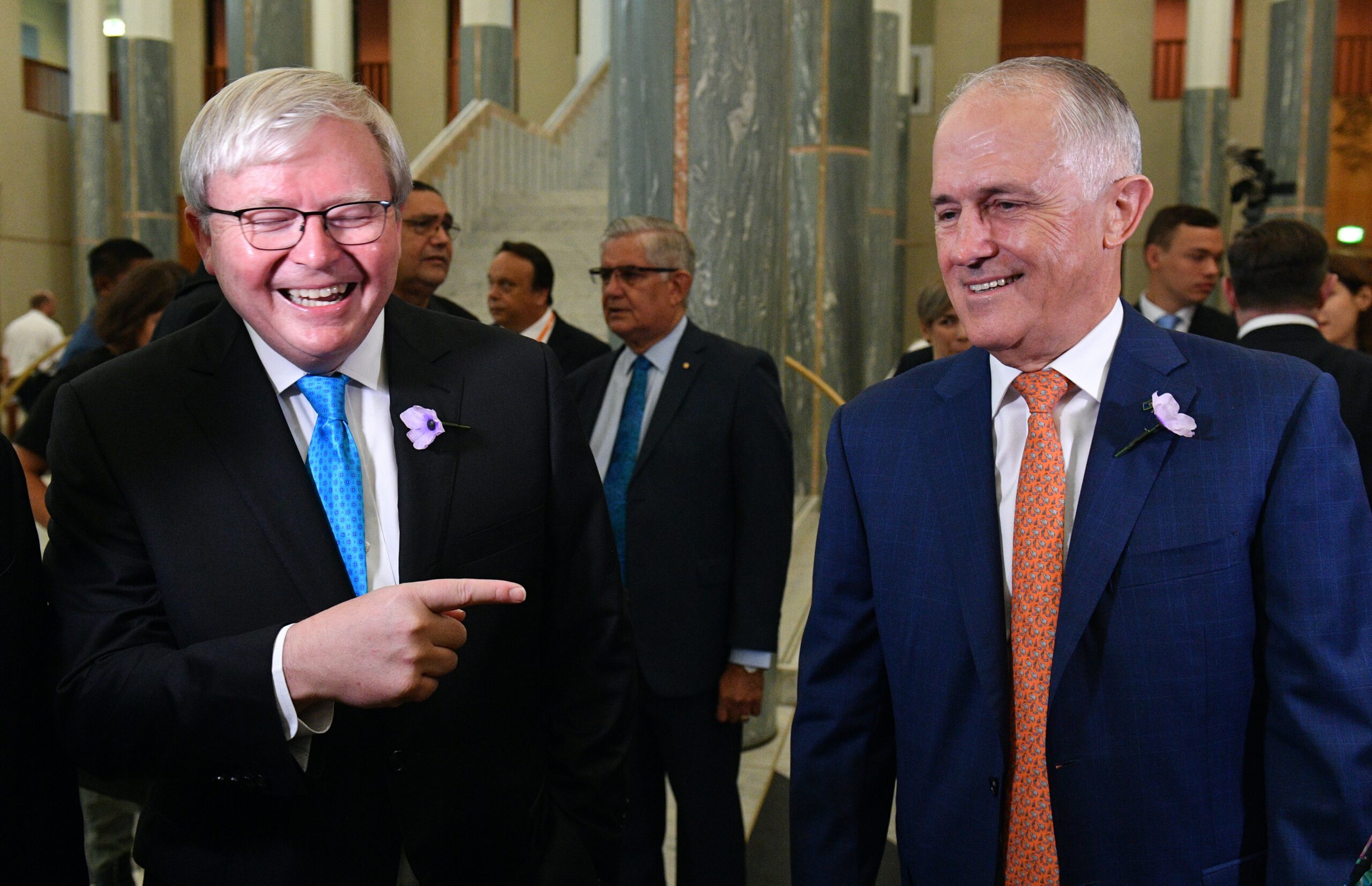
“The internet’s slow, I’ll grab my phone.”
In 2013, Australia reached a fork in the road. One side, Kevin Rudd’s governing ALP, had a truly world-class proposal for the future of the country’s internet. The other, Tony Abbott’s LNP Coalition, did not.
And our mainstream media fucked it up colossally. Not just Murdoch, all of it.
While our mobile internet is exemplary, currently 5th fastest in the world, Australia’s broadband network continued to slide further down the global rankings, hitting a low of 68th in January this year. Now more of us have some form of fibre, at least some of the way to our homes, that trend has turned around and we’re sitting pretty at 60th – well behind Trinidad & Tobago, but high-five for beating Kazakhstan.
It did not have to be like this.
We didn’t need to become a nation of bleary eyed sports fans eschewing giant plasma screens for five-inch smartphone displays; as our work-from-home lives exaggerated the need for Zoom calls and 4K Netflix docos about insane tiger trainers, we didn’t also need to be grappling with our slower, more expensive, “cheaper, faster” version of the NBN.
Rare is the meaningful difference between Australia’s two major political parties beyond who likes coal and who loves coal. But during this nation-defining moment, when presented with a question to which one side had objectively the better answer, our media continued on autopilot. What should’ve been a journalistic slam dunk instead resulted in more false balance than an inner ear infection.
Our proud nation, of course, had other priorities at the time, like carbon emissions (we wanted more, not less) and refugees (we wanted to indefinitely cage them, not help them), but Aussies weren’t even presented with the actual real options on the question of whether we wanted shit internet or not.
Communications technology was a less sensational issue buried amongst all the borders and the boats. The NBN was a chance for politicians to do their businessman impersonations, using focus-grouped phrases like “Multi-Technology Mix” while hoping journalists wouldn’t ask why they were allergic to fibre – moral or otherwise. And the caper worked. The fourth estate slept on Australia’s future and we hurtled to our copper fate.
Crucially, all of this was extremely obvious at the time, if you knew what you were talking about.
Nick Ross, then tech editor for the ABC, knew what he was talking about. In February 2013 he wrote the following.
“The Coalition’s broadband policy slogan states that they will ‘Complete the current NBN cheaper and faster.’ This simply isn’t true… In just about every case the Coalition’s alternative compares unfavourably to the current plans – and usually in dramatic fashion.”
A week after the 2013 election, after our nation had signed on the copper line, he wrote:
“The key problem is that the copper network represents the cornerstone of the Coalition’s $30bn policy and is closely-related to the current $11bn deal between NBNco and Telstra. Can it be justified for vast sums of public money to be spent procuring a network, with such a history of neglect, without it being audited first?”
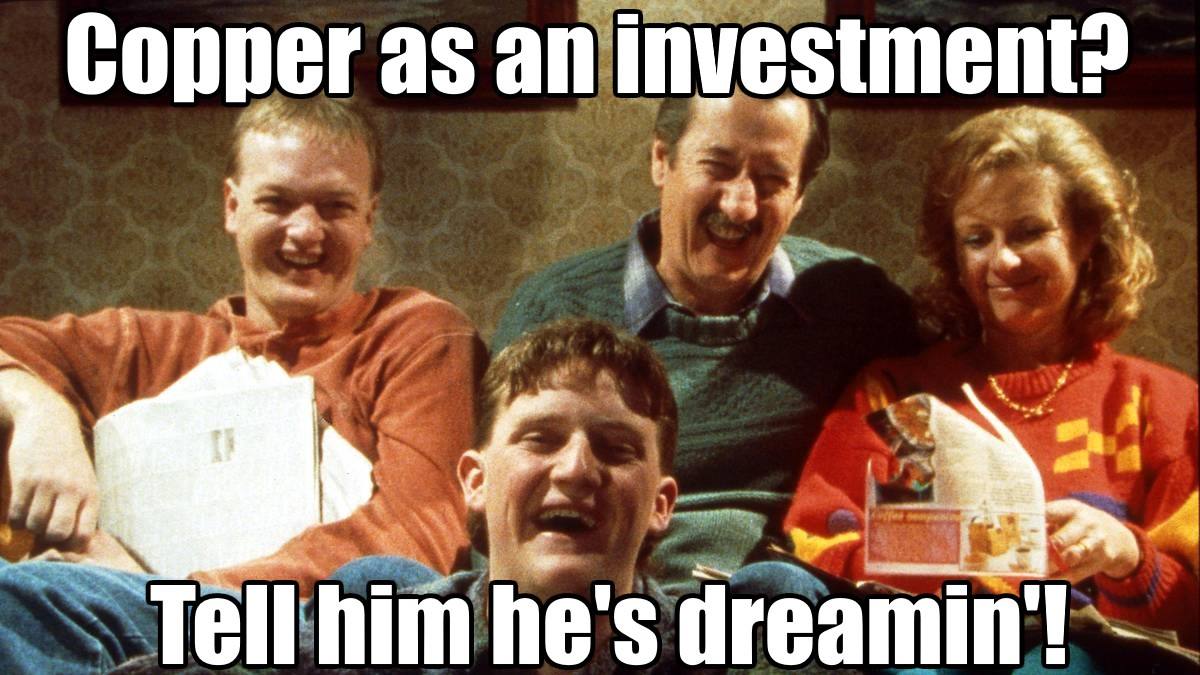
Again, Ross was correct. Factually. The problem, though, is that he wrote all of this months before the election when it might have mattered, and was told, explicitly, to sit on it.
For the crime of getting it right, ABC management had a “little chat” with Ross. And Ross ultimately quit over concerns his reporting was being gagged to please a Coalition government with a penchant for budget cuts. Ross’ stance and actual knowledge – read: knowing what he was talking about – led to his departure.
In 2016, after he left the ABC, Ross explained his side of what happened in a Reddit Ask Me Anything:
“In early March 2013 I was told by a senior ABC manager that ABC Management was expecting the Liberals to win the next election and that Malcolm Turnbull would be in charge of the ABC and that they didn’t want to upset him. From this point on I documented everything.”
A month later, in April 2013, Ross wrote an article about how Turnbull’s repeated claims the Liberal NBN would be cheaper was factually incorrect. Technically impossible. Which it was. This article was never published.
Ross went on: “After that I had articles held back (one wasn’t published at all) and heavily pressured not to write anything on the matter.”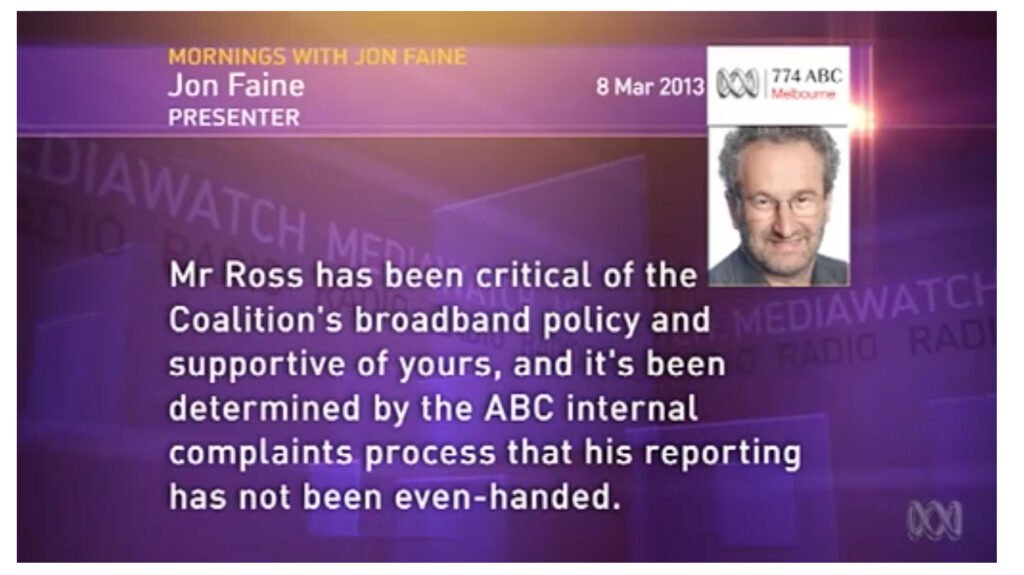
Many senior figures in the ABC were critical of Ross’ reporting, claiming it wasn’t “even-handed”.
Our question is, who cares? Ross’ reporting was factually correct. Why does anything else matter? Should journalism act in the public interest, or in the interest of preserving journalism?
In May, during a secretly recorded meeting between Ross and Bruce Belsham, ABC’s Head of Current Affairs, Ross was warned:
“If we publish another [negative story about the Coalition’s NBN] at this point, it’s going to be difficult for you. What I would suggest, to give yourself a bit of capacity to be able to do a few more of these, is to turn the vision around a bit and find some element of the Labor plan, of the NBN plan, which is up for debate. And purely focus on that. If you publish one of those it will make a lot of difference.”
Though Ross’ case is the highest profile example, he was not alone in seeing through the spin. The nerds saw this coming a mile off.
Games and technology media, a sphere I work in, nailed this story repeatedly. The likes of Kotaku, Gizmodo, Game Informer, and IGN all warned of the looming disaster to come. And we did it at a time when it still mattered.
While big boy, serious pants media fumbled the ball spectacularly, specialist media showed how it should be done. And though it was driven by the desire to not get pummelled in Street Fighter by kids overseas, that was never really what it was about. It was about responsible spending of a colossal amount of money – something the Coalition always claims it’s good at. It was about the future. Our future.
The problem, as usual, is no one listened to the people who actually knew what they were talking about.
***
History should remember Tony Abbott and Malcolm Turnbull as two sides of the same copper coin wedged into Australia’s borked internet.
Labor’s bold, original plan to bring fibre directly into Aussie homes set off alarms for the Coalition and its allies. The vested interests in an outdated internet were, again, obvious, if you knew what you were talking about. Murdoch’s hydra had Aussies over the barrel with exclusives like live sports, and drama like pre-Season-8 Game of Thrones. Telstra was happy to stay a well-fed middle-man.
Experts warned against laying new copper, but everyone was more interested in net profits than net prophets. Cue mountains and mountains of this crap, from basically everybody.
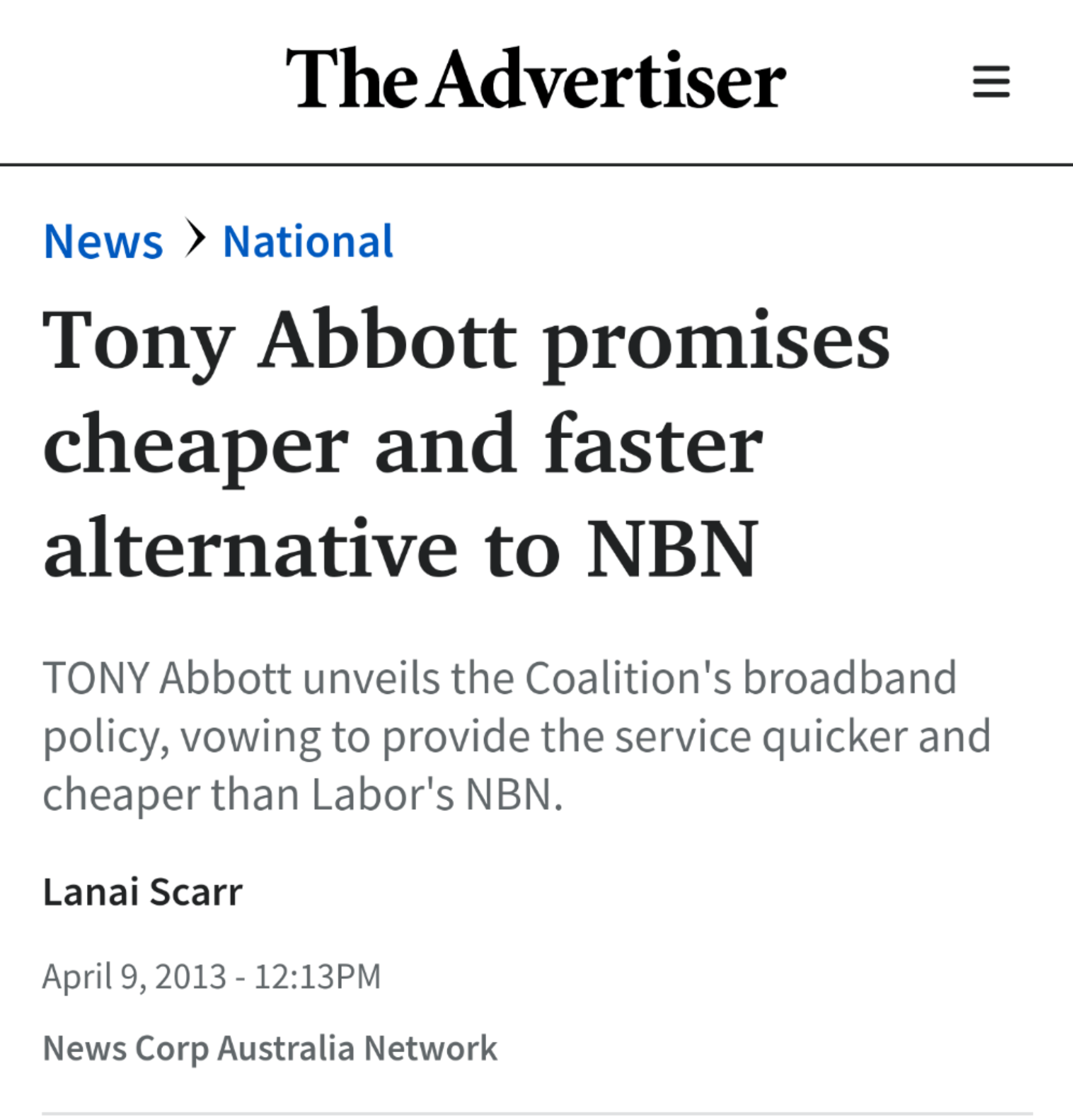
With rural and Coalition voters still pro-less-shit-internet on balance, it would’ve been political suicide to govern with zero plan for the future of Australia’s internet. So, after Abbott had initially threatened to dismantle the NBN, media of all persuasions fell for the good-cop-bad-cop routine. They praised Turnbull, then-Shadow Minister for Communications and Broadband, for his heroic Malcolm in the Middle compromise that “saved” the NBN.
The Coalition’s $29.5 billion Multi-Technology Mix (MTM) of course quickly blew out to at least $51 billion, probably even more. Michael West argues that when share prices are included, the cost is closer to $90 billion. Either way, it’s significantly more than Labor’s plan of $43 billion (which too might have blown out, but we’ll never know). Crucially, our NBN was designed to be sold at a profit, but valuations of our copper network run between $7 and $25 billion. A massive loss, no matter how you swing it.
As of today, the Coalition’s NBN, which the nation “chose”, has laid enough new copper wire to wrap around the entire planet. All of which, before long, will have to be ripped up and replaced with a technology not from the early 19th century. In fact it’s already started happening.
And here’s the kicker: they knew it all along.
Turnbull isn’t the kind of politician to believe his own spin. He is self-interested, not a zealot – the only trickle-down tale he’s a fan of involves Engadine Maccas. He’s smart. He damn sure never believed copper was the future. He’s not a true believer, he was in on the con.
He knew his product was inferior when he looked down the lens, parrying questions with exasperation, as though we should be grateful for the snake oil. “But how are you going to pay for it, Leigh?!” Normally Australia delights in cutting down the tallest of poppies, but Turnbull’s weaponised arrogance cowed reporters into an all-too-common trap of modern journalism.
The safe option: false balance
It’s sunny outside. It’s raining outside. Two views given equal weight. Job done, viewer makes their own mind up, now over to sports. It’s a media criticism cliche now that a journalist’s job is not to parrot both these views, but to stick a head out the window and see if you get wet.
We knew what to expect from Murdoch on this issue – everyone did – but the rest of Australia’s dysfunctional fourth estate stuck to the narrative like obedient stenographers. Inaccurate Coalition quotes occupied headlines and ledes. Absurd figures from the Coalition about the cost of Labor’s NBN were parroted. Bogus methodology and assumptions were reported on uncritically. If you bothered to tally up the fibs, “Turnbull said some stuff” should not have been enough grounds for a story.
The false balance doctrine claims to give the reader the facts and then let them decide. But in a climate where politicians flog deliberate untruths as often as they exhale, uncritical transcriptions do not give us these facts. While our press core yanked the blanket to cover their asses with false balance, Australians were left out in the cold.
Nick Ross stuck his head out the window. He not only told us it was raining, he told us how badly copper degrades in the rain. But he was soon on the outer, because in Australia appearing balanced trumps the actual truth.
The gaming and tech press still railed against the Coalition’s NBN, not because of the billions of dollars in lost productivity, but because Xbox makes you download updates before you can play. But that sphere isn’t big or influential enough to matter.
Of course voters went into the booths in 2013 with more on their minds than slow Skype calls, but it’s worth considering what a properly informed populace could accomplish in Australia.
***
If media in 2013 felt like a collective madness, it’s nothing compared to 2020. Black is white. Down is up. Political reporting is indistinguishable from sports, anyone can say anything, the fact-checkers need fact-checkers, and as long as we’re tearing each other apart in a culture war, we don’t notice the massive upward transfers of wealth and selling of natural resources.
But unlike the complex economic issues we grapple with today, the NBN was a gimme. A public policy layup. No matter which lens you put over it – costs, maintenance, rollout, data speeds – the fibre plan was superior in every single way. Just as Nick Ross explained. Just as most niche games and tech media explained. And just as every single major media outlet in the country failed to explain.
When the answer is clear and the experts all point in one direction, why does our nation lack the mechanism to just say that?
It’s great that Turnbull has come out on the right side of climate change, and is speaking out against the Murdoch monopoly. He is, on the related issues of climate change and Murdoch’s cancerous impact on democracy, making up for lost time. But one thing Turnbull will always own – yet never own up to – is our ten-year broadband brownout. And the blame is shared by every enabling stenographer in the media who didn’t dig deeper than the topsoil to find out the Coalition’s claims didn’t have an ounce of fibre.
The real NBN – the fibre one – won’t be finished for years to come. We first have 50,000km of freshly installed copper to replace. That’s a ten-year internet handicap at least, all because our politics won’t allow one side to admit the other has a good idea, and our media would rather be safe than correct.
***
By Jeremy Ray
More like this
Dave Milner





